X-Men Vignettes, Chapter Twelve (1987)

X-Men Vignettes, Chapter 12 (1987)
“A Fire in the Night!”
Writer – Chris Claremont
Art – John Bolton
Letters – Tom Orzechowski
Colors – Glynis Oliver
Edits – Kavanagh, Nocenti, Shooter
From: Classic X-Men #12 (August, 1987)
Before we get into today’s discussion… wanted to speak in (hopefully) brief about a Comixistential Crisis I’m currently experiencing. Maybe it’s something some of the folks reading might be able to relate to.
If you’ve been following my BS for the last several years, you’ll be familiar with many of my “chestnuts”… the stuff I say over and over again — sometimes pertaining to the act of comics content creation. I’ll drone on (and on) about the loneliness of the endeavor, the thanklessness of the endeavor… pretty much the prison it can become. Wow, why do I still do this?
Anyway, this weekend I came face-to-face with another challenge presented by content creation. This is almost certainly a “Chris Problem”, but if anybody gives a toss, I’d love to hear your thoughts on this as well. I sat down with the intention of catching up with the last couple of issues of Fantastic Four. I’d decided I’d give the FF (and Dan Slott) another opportunity to disappoint me with the current The Reckoning War story arc.
So, I sit down with the books… lean back on the couch, and prepare to give it a go.
Annnnnd, well — I came to the scary realization that… I think I’ve forgotten how to read comic books “for fun”. I think this content-creation hobby has… broken me. I don’t know how to read comics anymore. If I’m not planning on writing too many words here, or spitting too many words into a microphone about a given comic — I no longer have the ability to allow myself to just read the thing.
This brought up a lot of questions and concerns… most pressing among them was: Do I still like comics? Am I still a fan? If so, how do I just let go and, ya know read the damn things again — and, if not — then, just what the hell am I even doing?
I really don’t know, gang.
Has my comics fandom, no pun intended, mutated? This is a toughie. I really dunno. Am I just a dude who hoards comics and content anymore? Is there anything intrinsic to this anymore (outside of the compulsivity and addiction, anyway)? Again… I dunno.
If anybody reading (well, if there IS anybody reading) who’s faced a similar comixistential crisis… please lemme know!
Anyway, apologies for droning — and with all that hoo-ha out of the way, let’s get to today’s Vignette — it’s a good one!
—

We open in Paris, where Magneto is sleeping off his recent battle with the X-Men — or, trying to anyway. We can probably assume that this story takes place very shortly after the lead-off story in this ish of Classix (which reprints X-Men #104 – April, 1977). Anyway, Magneto is trying to catch a nap, but finds himself haunted by dreams of his past. Now, Magneto’s early years had received quite a bit of filling-in during the Claremont run, starting with Uncanny X-Men #150 — which, was where we first began to learn of his plight during the Holocaust, as well as his marriage to Magda. Unlike the Phoenix-Retcon being “spoiled” in the Jean Vignette a few chapters back, I don’t see any problem telling Erik’s story here, as it should effect much of the x-perience from here to the “canon” revelation. He’s only going to be showing up a handful of times between X-Men #104 and Uncanny #150. Anyway, Magneto’s dreams have to do with the end of the Holocaust, and the shutting down of the Auschwitz prison camp. The remaining Nazi guards were picking off prisoners as to leave no witnesses. Magneto bashes one of ’em over the bean with a 2×4 just as he’s about to put a bullet in Magda.
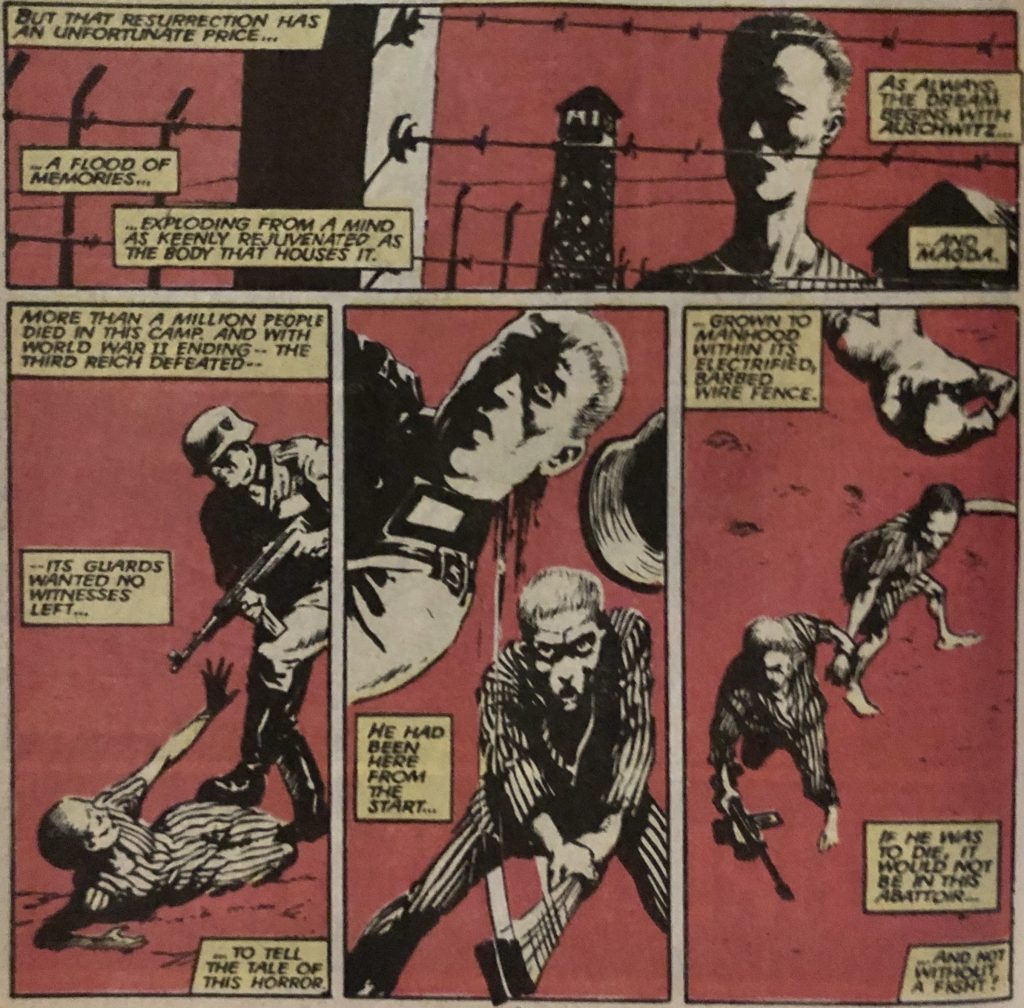
We get a shot of our man still restlessly sleeping before popping back into flashback-dreamland. Erik and Magda have escaped into the frozen winter wastes. Magda is fearful that they’ll be hunted down and hilled. Erik swears that he will protect her always. Worth noting, Erik is speaking here as just a man… not as a metal-manipulating mutant.
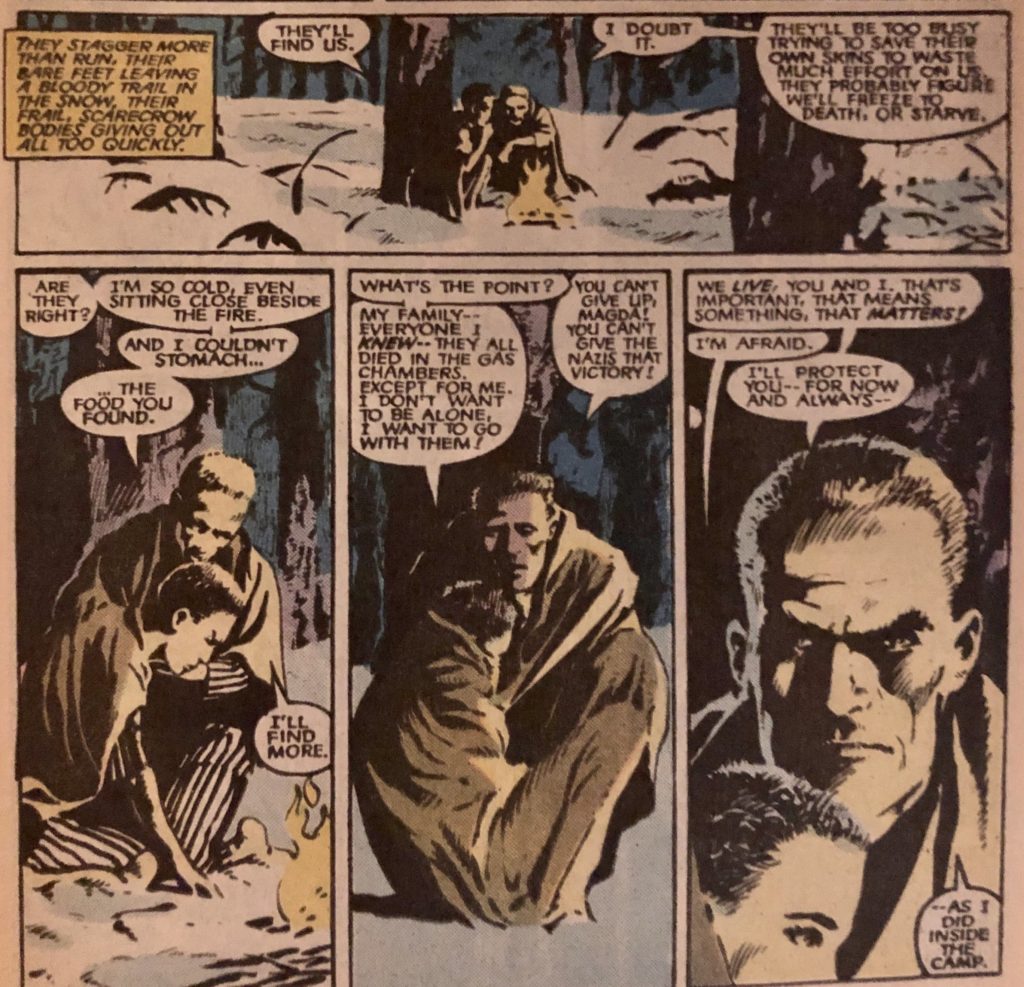
Next we know, we get a montage covering the next several months (years?) of the Mags’s’s life. Erik and Magda move to a village in the Carpathian Mountains, where they made a new life. Made new friends, learned how to live among and as normal folk, they’d marry — and even have a daughter (Anya) together. Anya is a new addition to the Magneto lore… and, well — don’t get too attached.
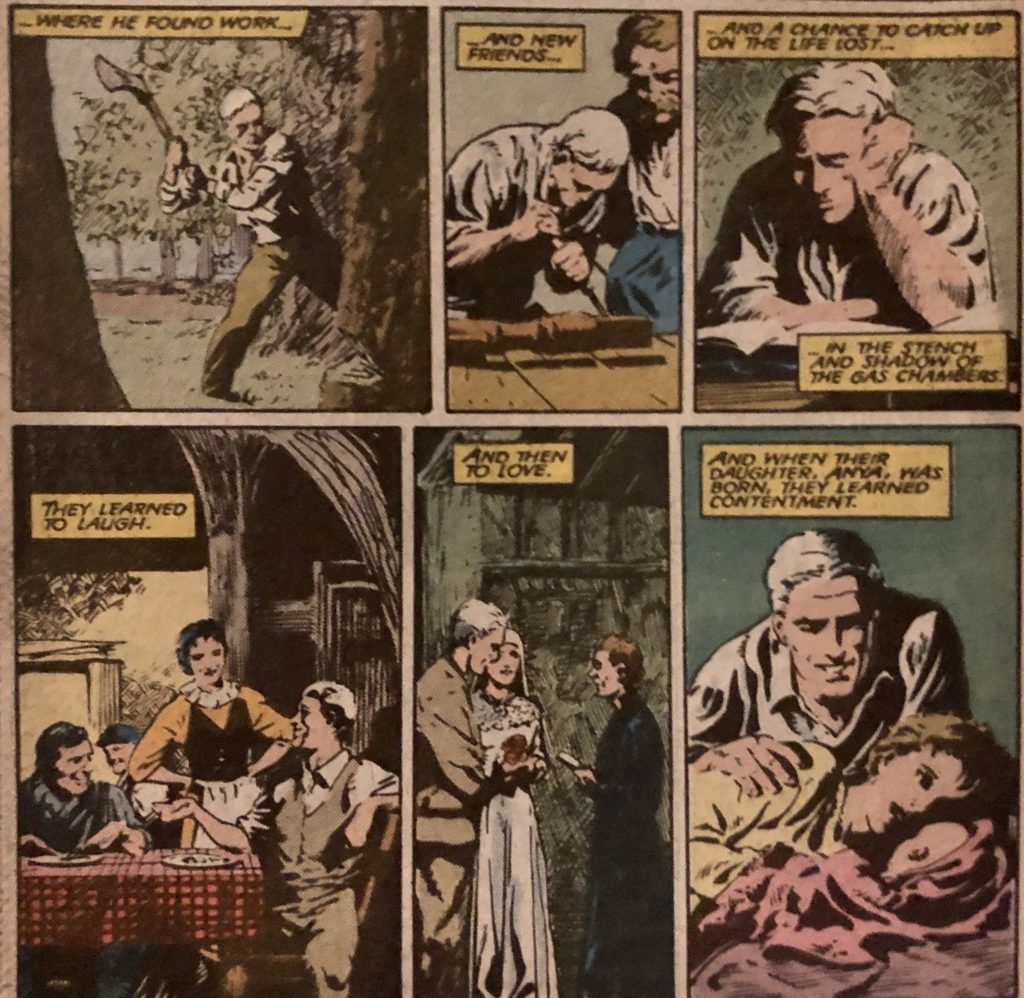
From here, Erik decided he wanted more for his little family (ya know, like… food) — and so, would travel to the “Socialist Workers Paradise” of Vinnytsia, Ukraine. Magda swears she can feel the eyes of the locals on them — which, Erik doesn’t seem too concerned about. The Ukrainians just aren’t used to seeing “country bumpkins” beboppin’ around their workers paradise. He kisses his gals goodbye, and tells Anya to take care of her mother.
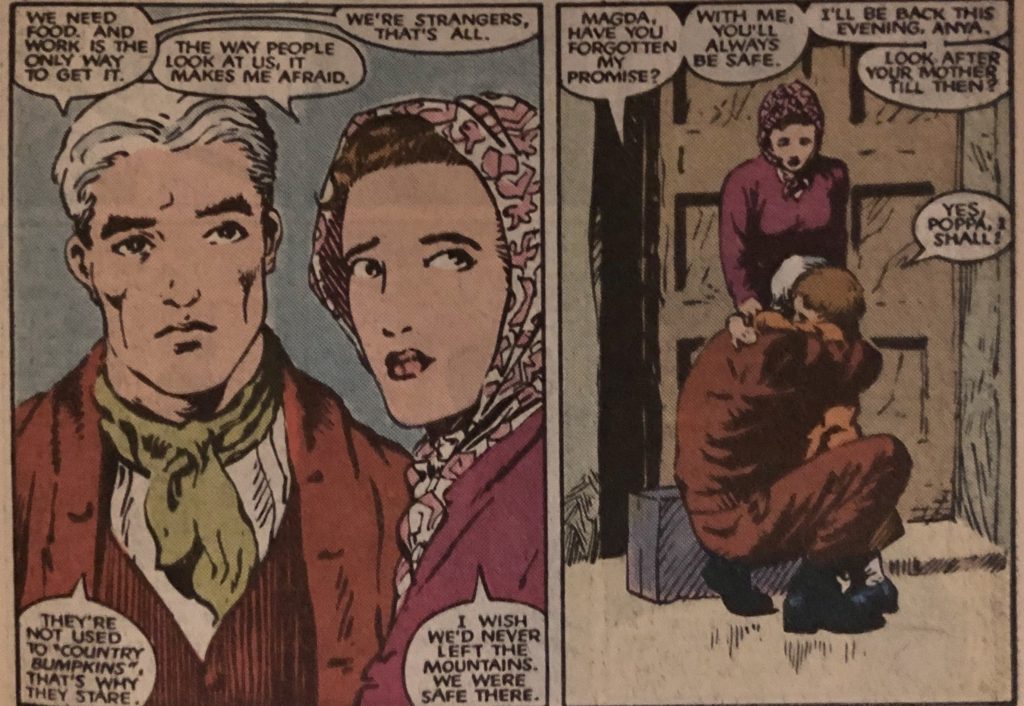
We jump to the end of the workday, where Erik goes to collect his wages from — well, some asshole. This guy only pays him half of his promised earnings, keeping the other half for himself as a “commission”. Our man pitches a bit of a fit — to which, he’s warned to shut uppa his face and keep his head down, otherwise he won’t work another day. Our man, as you might imagine, isn’t cool with this. He’s so angry, in fact, that he somehow manages to hurl a crowbar into the wall next to the dude — ya know, without using his hands. I’m not sure if this is still considered the first time Erik realized he had powers — as, I’m pretty sure they’ve tried retelling bits and pieces of this one a dozen or so times since. Anyway, Magneto winds up getting his full wage… but, we’re about to find out that it’ll come with a much higher price.

Erik heads back to the inn where he and Magda are staying… where he plans to share with her his newfound amazing powers. Only, upon arrival, he finds that their building has been set ablaze with Magda and Anya still inside. It doesn’t seem like this was arson — or an attack on the Lehnsherr family, just a fire (unless I’m missing something obvious). Anyway, Erik rushes in and collects Magda, who was on the ground level. He unwittingly engulfs them both in a protective magnetic bubble while he scans for Anya. She is trapped upstairs.

Erik deposits Magda safely outside before going to rush back in to save their daughter. Before he can, however, those assholes from the workers paradise jump him! The proceed to pummel him for “extortion and assault”… all the while, his little girl is literally burning to death within his view! He begs them to let him save his child — and gets the “you brought this upon yourself” response.

Anya lets out one final scream while Erik is being restrained. It’s quite a powerful scene… and it makes you angry just looking at it. The Wage-Man is all “Welp, sucks to be you…”, and once more suggests that Mags only has himself to blame. Here’s where the stuff hits the fan, my friends…

Erik lets out a shout… and, rather than showing us exactly what happens next, we get a blacked-out panel instead. Claremont chose wisely here — I feel like this “quiet approach” is far more powerful than a full-blown early-90’s style gore-fest of bubbling skin being torn from smoldering bone. We do, however, see the aftermath — which is, well — basically bubbling skin and smoldering bone. But, it’s more of a solemn and… I dunno, it just doesn’t feel like it’s being done for “shock”. I wouldn’t say it’s “tasteful” or anything — but, like the blacked-out panel that proceeds it, it’s powerful. Magda, having seen this all go down first hand (while her daughter was literally burning to death a few yards away) is… well, she’s pretty freaked out. She has a reaction the likes we haven’t seen since the last time we visited the ballet!

Full’a FEAR AND HATE, she calls her husband a MONSTER… and runs away from him. Thus ends Erik’s nightmare. He snaps up in bed shouting Magda’s name. As he sits there awake, he smells fire. Looking out the window, he, well, he sees fire. Also a woman and her baby trapped in that fire crying out for help. He figures that this might’ve been what triggered his fiery flashback. He stands there for a beat, considering intervening… before deciding that this isn’t his concern, and the Parisian Fire Brigade are more than capable.

This takes us to our ending, where Magneto does in fact intervene — saving the woman and her child, returning them both to their husband/father down below. They treat our man as a hero — and ask if there’s any way they might repay him. Without missing a beat, Erik says there is a way. He wants them to spread the word that they’d been saved by… Magneto. Magneto the Terrorist, Magneto the Super-Villain, Magneto… the Mutant.

—
Now, this was a great Vignette.
I tell ya what… this one runs the gamut of emotions, tells an excellent story, and humanizes a character who, up to this point (Classix-wise) has been portrayed as little more than a ranting supremacist lunatic. It’s stories like this that can remind us how powerful a medium comics/sequential art can (and should) be… even in the realm of superheroics.
What this story also does is… remind me how much I dislike the fact that we’re currently living in this age of decompressed storytelling. I know, I know… there’s no such thing as “decompression”, it’s just a mass-hallucination we “entitled manbabies” have independently concocted to justify why we dislike something. But, that said — Claremont and Bolton are able to share with us this story in, what, 8-10 pages? In those 8-10 pages, they tell us everything we need to know — while also giving us a framing sequence to squeeze it comfortably into the “now”. They wouldn’t be able to fit this much story into 8-10 issues nowadays — hell, three of those issues would just be Magneto staring at a wall or turning his head a bit to the left.
In these scant pages, we learn so much about Magneto. Where he came from, where he’s been — what he’s seen, what he’s experienced… and what he’s lost. Let’s talk about loss… but, not the loss you might be thinking of. We’re not gonna talk about Anya… yet.
Instead, I’d like to chat a bit about Magneto’s faith in humanity. If we flip back a page or two before the Inn-Fire… we see Erik getting ready to trudge off to the “workers paradise”. It’s Magda who is wary of the people around them. And, sure, it stands to reason that a Holocaust survivor would be a bit antsy in a new locale… surrounded by new people, who might give an odd look or two.
This is very subtle… and perhaps even unintentional (though, I doubt it). While Magda is expressing her fear… it’s Erik who tells her not to worry. Despite the fact that he too survived the horrors of the Holocaust at Auschwitz — he hasn’t yet lost his faith in humanity. He comforts his wife, telling her that people aren’t giving them strange looks because they are Jews… but, because they’re “country bumpkins”. Is he speaking truthfully here? I dunno… but, I feel like this line speaks to Erik’s want/need to believe in the goodness of humanity. He’s been robbed of so much by his fellow man, but he’s not quite ready to give up on them. Like I said, it’s subtle… and, as usual I’ll drop my “I might be thinking too hard about this” tagline.
Keeping with the linearity of the flashback — Erik is stiffed by the Wage-Man, and is expected to just grin and bear it. His rage is what causes his mutant power to manifest (at least in this telling), which results in, not only his getting his full earnings — but, his revelation that there’s something a little x-tra about him. Now, here’s another subtle bit — from what we know/knew about Magneto, from everything we’ve been told, and all the stories we’d seen him in — we might be trained to expect that this would be a whole different sort of tipping/turning point for him.
Most of our previous x-periences with Magneto feature him as… pretty much a foaming at the mouth loon, yes? Now, with the added wrinkles of his oppression at Auschwitz… we might think that the realization that he has these amazing abilities would cause him to go all power-mad, right? Like, just full-blown “Bwa ha ha” villainous insanity. But — he doesn’t! His first (and only) impulse here is to go home and share this newfound knowledge with his wife. Again, he hasn’t lost his faith in humanity… yet. He knows he can do things most men can’t… but, hasn’t applied the concept of “superiority” to it. He also doesn’t seem to think that this is something that ought to be FEARED AND HATED. That might speak to naivete — or, again — just faith in his fellow man. Perhaps both?
From here, however, no matter how many times our man presses his luck — every spin comes up Whammy. There’s the fire at the Inn… he’s beaten by the Wage-Men… he’s witness to his precious daughter literally burning to death… and, finally — after snapping, Magda runs away from him in fear… referring to him as a “monster”. Sure, Claremont just treated us to a similar reaction in the Colossus Vignette — but, this story is strong enough where it really doesn’t matter how tropey some of its beats might come across.
The ending, with Magneto in the present rescuing the mother and daughter from a burning building feels like his “making good” on a lingering regret. A dark day in his past that, he can’t (and perhaps shouldn’t) ever get over. Him asking the family to spread the word that they’d been saved by… a terrorist, a villain, a mutant… is pretty powerful, as — in that moment, he wasn’t being seen as any’a that. To this family, he was a hero, a miracle, a gift from God… he might as well have been an Angel.
But, he wanted them to know who kept their family whole. A man who has become all too familiar with being FEARED AND HATED — for a multitude of reasons and in a multitude of ways. And yet… here he is, saving lives instead of endangering/threatening them. Like I said, it’s powerful… and, for a story that pretty much kicks your ass emotionally — it’s very, very subtle.
Worth a look, to be sure! Probably the strongest Vignette yet — maybe even the strongest one we’ll ever get!

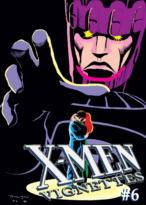
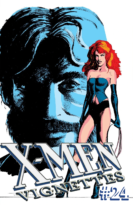
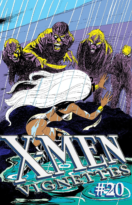
This seemed both familiar yet new…I’m probably mashing it up with stuff from Magneto #0 (?) or other flashbacky/Wizard-y contextual stuff over the years. Gonna have to track this down/dig it out if I have it.
This sympathetic/anti-hero/whatever Magneto–relatable, understandable, empathize-able, etc–as well as the Age of Apocalypse one–is very much “my” Magneto.
Lotta thoughts on your pre-ramble; gonna private message you later on that!
Awesome story. Just one observation- Looking at the artwork by Bolton, I’m not sure how the Ukrainian people would’ve know they were Jews.
It has been said that every villain is the hero of their own story. Stories like this that give us insight into why said character is how he is are excellent. Magneto’s tragic backstory along side Dr. Doom’s is the reason why Marvel has the best villains who could have been heroes if things had gone just slightly different. A great story for a great character.